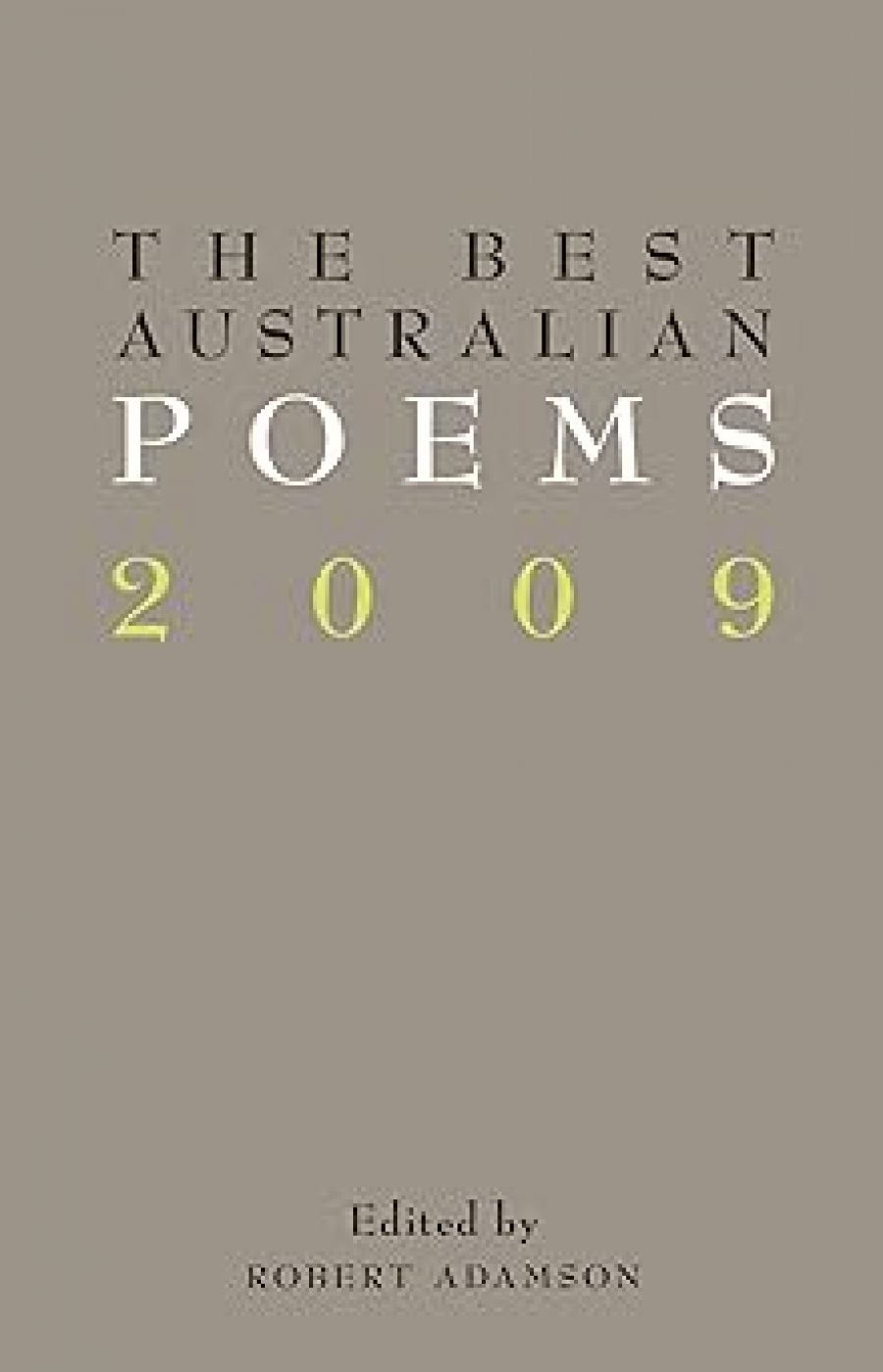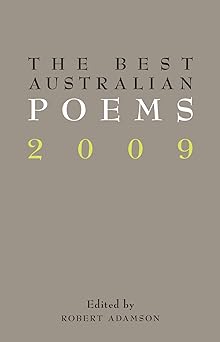
- Free Article: No
- Contents Category: Australian Poetry
- Review Article: Yes
- Article Title: The power of the incoming tide
- Online Only: No
- Custom Highlight Text:
Reviewing Martin Langford’s Harbour City Poems in the November 2009 issue of ABR, I remarked on the absence from the anthology of new young voices. This is a criticism that cannot be made of Robert Adamson’s selection for this year’s Black Inc. Best Australian Poems. Adamson, distinguished poet and Hawkesbury fisherman, has cast a very wide net, departing from the practice among recent editors of this fine series by including unpublished poems; some of these are from established poets, but several are from new and usually young writers whose work bears witness, in the editor’s words, to ‘the power of the incoming tide’. Thankfully, the days have gone when blokes who wrote poems selected their mates’ work when they came to edit anthologies. Adamson didn’t set out to redress any perceived gender imbalances, but more than half of his selection consists of work written by women; this has been ‘the year of the women poets’, as he says.
- Book 1 Title: The Best Australian Poems 2009
- Book 1 Biblio: Black Inc., $24.95 pb, 239 pp
- Book 1 Cover Small (400 x 600):

The inclusion of ‘performance’ pieces can be risky, for the obvious reason that even a sympathetic reader, confronted by skeins of wild and whirling words, doesn’t always have the head space to imagine what the presence of the poet’s speaking voice might have added. Spoken performance work is the extreme of unrhymed free-form writing, of which there are many examples in this book. I struggled with Matt Hetherington’s poem for Claire Gaskin: there are images that linger in the mind, but I can’t ‘voice’ the poem so that it yields a full weight of meaning. So, too, with Gaskin’s own poem, for all its wit and hard-edged brilliance (‘we mimic ourselves like drongos / “I’m not a single-mother, never seen a double mother”’). π.O’s ‘“Mo” McCackie 1892–1953’ crackles off the page into the ear.
The most memorable performance work of this anthology, however, is Ali Cobby Eckermann’s ‘Intervention Pay Back’. Hers is an indubitably personal voice (she speaks as a man in this poem), addressing reader and listener alike with searing immediacy:
I love my wife she right skin for me pretty one my wife
young one found her at the next community over across
the hills little bit long way not far
In his introduction, Adamson says that Cobby Eckermann’s poem is balanced by another long (much longer) work at the other alphabetical book-end of the anthology, John Tranter’s ‘The Anaglyph’, which pays witty literary-allusive homage to John Ashbery:
The Moment
Of Death is dallying on Ninth Avenue, as yet uncertain of
Its intentions. I’ll just leaf through the paper until
You wake up.
From the High End to Manhattan: this is perhaps what the editor means when he says that poets ‘sing to each other’, irrespective of their differences of culture and idiom.
In letters written during the 1960s, Gwen Harwood joked, ‘When you start writing about the birds, you’ve had it!’ (Wrong: she was to write some fine ‘bird’ poems herself.) Birds sing, chirrup, soar and preen their way through the pages of this anthology – hardly surprisingly, given that Adamson’s own poetic voice has long paid such eloquent tribute to the fusion of human and natural worlds (the introduction notes that ‘birds are the closest things we have, more or less, to angels’). By a fortunate coincidence, there are two ‘Egret’ poems (Debbie Lim’s with the definite article, Barry Hill’s without); both are elegant meditations on art and mortality, with the spare grace that characterises the woodblocks of Watanabe Seitei. (Another poem with strong pictorial associations is Meredith Wattison’s mesmeric ‘Holbein through Silk’; it will have resonances for anyone who has read Hilary Mantel’s Wolf Hall.)
Robert Adamson has performed a fine balancing act in setting ‘new’ voices in the company of established, older ones. There are some very fine new poems here from Judith Beveridge, Stephen Edgar, Clive James, Kevin Hart, Les Murray, Peter Porter and Fay Zwicky (to name but seven). In his ‘Morbid Transfers’ (i.m. Bruce Beaver), one of the many ‘intertext’ works in the selection, Peter Rose’s reputation as a narrative poet in full control of his craft is confirmed. In this recollection of a sudden death during a game of table tennis, a deceptively simple surface articulates a disturbing and complex meditation on the fragility of life and the callousness of Death’s witness:
... the server, too spirited for niceties
or condolences, stepped over the low excluding fence,
negotiated the crumpled mystery at his feet,
and retrieved his urgent ball without a word.
In a less solemn register, Mark Tredinnick’s ‘Improvisations on a Daylight Moon’ pays moving and subtle homage to Les Murray.
A good year for women poets 2009 may have been, but it seems not to have been such a good year for satirists of either sex – strangely, given the low comedy of political life in these days of Rudd and Turnbull. For all Alan Wearne’s mastery of rhyme, his ‘Dysfunction, North Carlton Style, or The Widow of Noosa’ is (to this reader at least) a pointless and singularly unfunny work, with a strong whiff of the 1970s about it.
Anthologies for years to come will, I suspect, follow this one by including Dorothy Porter’s stunning late poem ‘Travel’ (first published by ABR), a meditation on death which invokes an unlikely pair of shades, those of William Blake and the Venerable Bede. Now that the first anniversary of her death approaches, we should all be grateful to Robert Adamson for prefacing The Best Australian Poems 2009 with Martin Harrison’s beautifully under-stated and ‘unfinished’ poem ‘Word: i.m. Dorothy Porter’:
o what a life in words o how much quiet light
in those young rooms back then by the harbour
which could have sheltered us eternally in the value
of sweet speech ignoring the plot’s speed so what’s in a
We must again be grateful to Black Inc. for the high quality of their book production in this series, which goes from strength to strength.


Comments powered by CComment